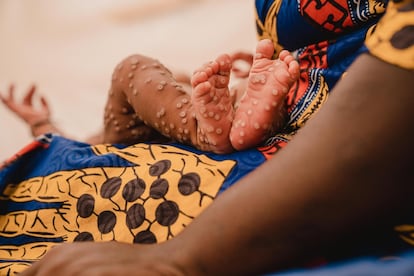Mpox, an emergency for children
In the Democratic Republic of Congo, approximately 80% of those who have died from the virus are minors under 15 years old. Often, they are also facing other challenges, including conflicts, displacement, droughts, floods and malnutrition

At only one month old, the little arms and feet of Aline, a baby from the Democratic Republic of the Congo (DRC), are covered with pimples, soon followed by a very high fever. Aline has mpox, a viral disease, formerly known as monkeypox that was declared a public health emergency of international concern by the World Health Organization (WHO) on August 14, 2024. “I saw a pimple on my daughter’s face and didn’t think anything of it, but as the days went by, the pimples grew in size and number. When we arrived at the hospital, I was told that we needed to be admitted because the baby was suffering from mpox. She had a high fever and was in a lot of pain. It is too much pain for me to bear. I urge other parents to protect their children,” the mother laments.
The situation is of particular concern in Aline’s country, the DRC, which is the epicenter of the multi-country outbreak, with almost 20,000 cases reported since the beginning of the year, about 60% may be children under 15 years of age. Cases linked to the DRC have been reported in neighboring countries: Burundi, Rwanda, Uganda, and Kenya.
The mpox outbreaks demand immediate action to protect communities and especially the most vulnerable populations, including children and pregnant women.
Children are at a higher risk of severe mpox compared to adults: in the DRC, where the proportion of deaths has remained below 5% since 2023, approximately 80% of those who have died from the virus are children under 15 years old.
In Burundi, where, over 320 cases have been detected so far, about 40% are among children under 10, and about 25% among children under 5 years of age
The new variant of the mpox virus (Clade 1b) has the potential to spread rapidly, with an increased risk to children and pregnant women who can transmit the mpox virus to their babies during or after pregnancy.
Protecting children is a priority because many children at risk are already facing other challenges, including conflicts, displacement, droughts, floods, malnutrition, and other disease outbreaks such as cholera, polio or measles. In addition, public health emergencies can have harmful wider impacts on children through measures such as school closures that disrupt education and learning. Public health emergencies also increase risks for child protection, particularly for girls who face a greater risk of gender-based violence. Also of concern is the mental health of children affected by mpox as they may face stigma and discrimination, adding to the challenges they already face.
In responding to the mpox public health emergency, it is essential and urgent to prioritize the needs of affected communities, especially children. Organizations such as UNICEF are already taking actions by raising awareness about the disease, and how to prevent it. UNICEF also procure and distribute medical kits to manage and treat confirmed cases, and hygiene kits to prevent infection. Continuing to ensure essential services, particularly for children and pregnant women, addressing issues such as malnutrition and continuity of ante-natal and post-natal care, and offering psychosocial support to those affected can help to limit impact on communities. All this, without losing sight of the many other issues facing children today. Additionally, there is a need to strengthen the health systems of countries — already weakened by previous epidemics — so that they can be increasingly better prepared for future outbreaks.
We also need to learn more about the virus through research and studies that look in more detail at how it affects people and society more broadly.
The Covid-19 pandemic has highlighted the importance of putting the best interest of the child at the center of our response to public health emergencies. By ensuring that every child is protected and safe during an outbreak, we can help prevent other children, like baby Aline, from going through such an ordeal.
Sign up for our weekly newsletter to get more English-language news coverage from EL PAÍS USA Edition
Tu suscripción se está usando en otro dispositivo
¿Quieres añadir otro usuario a tu suscripción?
Si continúas leyendo en este dispositivo, no se podrá leer en el otro.
FlechaTu suscripción se está usando en otro dispositivo y solo puedes acceder a EL PAÍS desde un dispositivo a la vez.
Si quieres compartir tu cuenta, cambia tu suscripción a la modalidad Premium, así podrás añadir otro usuario. Cada uno accederá con su propia cuenta de email, lo que os permitirá personalizar vuestra experiencia en EL PAÍS.
¿Tienes una suscripción de empresa? Accede aquí para contratar más cuentas.
En el caso de no saber quién está usando tu cuenta, te recomendamos cambiar tu contraseña aquí.
Si decides continuar compartiendo tu cuenta, este mensaje se mostrará en tu dispositivo y en el de la otra persona que está usando tu cuenta de forma indefinida, afectando a tu experiencia de lectura. Puedes consultar aquí los términos y condiciones de la suscripción digital.








































